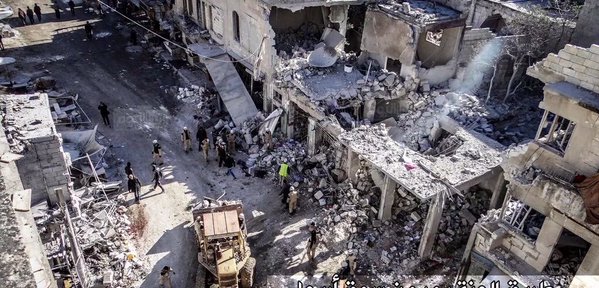PHOTO: A devastated market in Ariha in Idlib Province after a Russian airstrike on November 29
Amnesty International has challenged Russia’s response to findings of war crimes by its forces in Syria, saying that Moscow has “failed to substantively address evidence they violated the laws of war”.
On December 23, Amnesty summarized 25 Russian attacks and documented six of them in Homs, Idlib, and Aleppo Provinces that killed at least 200 civilians and about a dozen fighters. Complementing the findings of other NGOs such as Human Rights Watch and Medicins Sans Frontieres, it concluded:
Russian air strikes in Syria have killed hundreds of civilians and caused massive destruction in residential areas, striking homes, a mosque and a busy market, as well as medical facilities, in a pattern of attacks that show evidence of violations of international humanitarian law.
Amnesty said the evidence indicated that Russian authorities lied to cover up damage to infrastructure and civilian sites, including a mosque and a hospital, and that Moscow used banned cluster munitions and unguided bombs on residential areas.
See Syria Feature: Possible “War Crimes” as Russia Kills 100s in Airstrikes, Then Lies About Them
Later that day, the Defense Ministry’s spokesperson, Major-General Igor Konashenkov, said that there was “no evidence” in the report and that its information was “completely false”: “They are the same clichés and fakes, repeatedly refuted before.”
But Amnesty notes that Russian officials has never presented any details to challenge or disprove the report, despite the opportunity to respond case-by-case. Instead, the Defense Ministry told Amnesty “to reveal who provided them with this so-called data and when”, or otherwise the sources would be publicized “by the Ministry itself”.
Despite the threat, Moscow’s officials never posted the sources to query the information.
Amnesty posts further information about the documented attacks and concludes:
The organization repeats its calls on the Russian authorities to fully comply with the relevant provisions of international humanitarian law in the planning and execution of any air strikes by ensuring that civilians and civilian objects, including homes and medical facilities, are not targeted.
Russia’s armed forces should take all feasible precautions to minimize harm to civilians and damage to civilian objects, including giving effective advance warnings of impending attacks when possible to civilians likely to be affected; ensure that targets are in fact military objectives; and, particularly in the case of medical facilities, adhere strictly to the presumption of civilian character in case of doubt. And they should halt any use of cluster munitions, and the use of unguided bombs in the vicinity of densely populated civilian areas.

